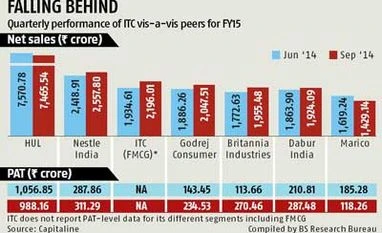ITC's non-cigarette FMCG business, called the other FMCG business by the company, broke even for the first time in 2013-14 since it was launched over a decade ago. Profits too were on the upswing. It reported its highest-ever segment profit at Rs 43 crore in the March 2014 quarter, raising expectation of investors and analysts that the business would do even better in 2014-15.
However, the figures of the last two quarters show that the consumer slowdown, which has dogged its peers all this while, is finally catching up with ITC. Revenue growth for the June and September quarters has fallen to 11-12 per cent. The company has also posted operating losses for two straight quarters: Rs 15.6 crore in the first quarter and Rs 10 crore in the second quarter of 2014-15 -after two consecutive profitable quarters.
While traditionally the June and September quarters have been weak for ITC, and its losses this year are considerably smaller in comparison to last year ( Rs 19 crore in the first quarter and Rs 13 crore in the second quarter of 2013-14), it's the slide in the pace of growth that contains worrisome signals for analysts.
Naveen Kulkarni, co-head (research), PhillipCapital, a Mumbai-based brokerage house, says, "While ITC's FMCG base has grown over the years, what we are now seeing are the effects of a high base. This is something that is afflicting most of its peers, notably Hindustan Unilever, and in an environment where the market itself has slowed, the strain seen in profitability and revenue run rate was expected."
Riding on food
Abneesh Roy, associate director (research/ institutional equities), Edelweiss, says, "Personal care is a competitive market. You have strong incumbents in the category. Taking them on is not easy. ITC has been investing heavily on its brands and launching new products in the space. This will take time to yield results."
With four different brands - Superia, Vivel, Fiama and Essenza - ITC has divided the market neatly, but its competitors such as Hindustan Unilever are also playing the same game, making it hard for ITC to brandish its products as unique. Hindustan Unilever Chairman Harish Manwani says his company would continue to straddle the price pyramid with products targeted at every segment. "Our strategy has been to have a portfolio of offerings. This means we have products at the centre of the market, at the bottom of the pyramid and at the top-end of the market," he said at the company's second-quarter results recently.
As having a product line ranging from one end of the market to the other loses its strategic edge, ITC is banking on a basket of innovations backed by strong advertising to help it stand out of the clutter. At the same time, the company is entering new categories - the most recent being its foray into deodorants which has notched up a market share of over 8 per cent since it was launched 19 months ago. In the last six years, ITC has entered every conceivable personal care space (barring oral care) from skincare to hair care, lip care, body care and fragrances, emerging as one of the few personal care companies with a high rate of product launches.
More launches
Despite slowing growth, the company plans to continue to launch more products in new categories. "The overall FMCG industry in India which was growing at 20 per cent a couple of years ago has now slowed to single digits across categories. While our margins are expanding, we continue to remain in investment mode in order to support our new and emerging categories," says an ITC spokesperson. The company has indicated that it could enter the beverages and dairy segments soon.
However, regardless of the foray into new categories, the strain on profitability is likely to continue. "We expect ITC's FMCG segment to post losses this fiscal," says Suruchi Jain, equity research analyst, Morningstar India. "Our key concern is that ITC is investing its profits from cigarettes in other businesses rather than giving it back to shareholders." While the company may not be fretting about slowing sales, the road ahead appears bumpy for the FMCG major.
)